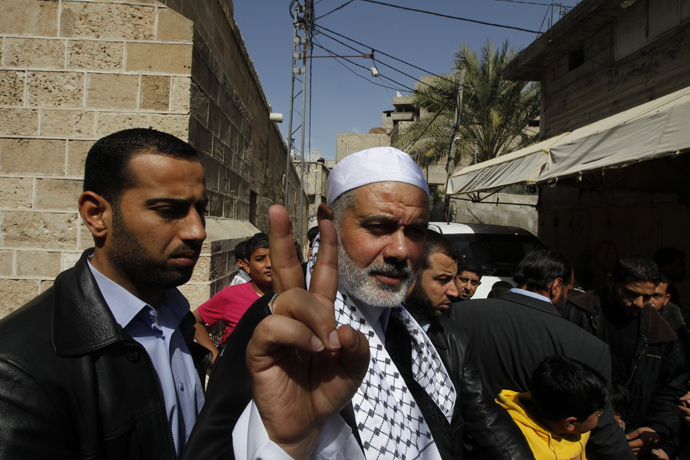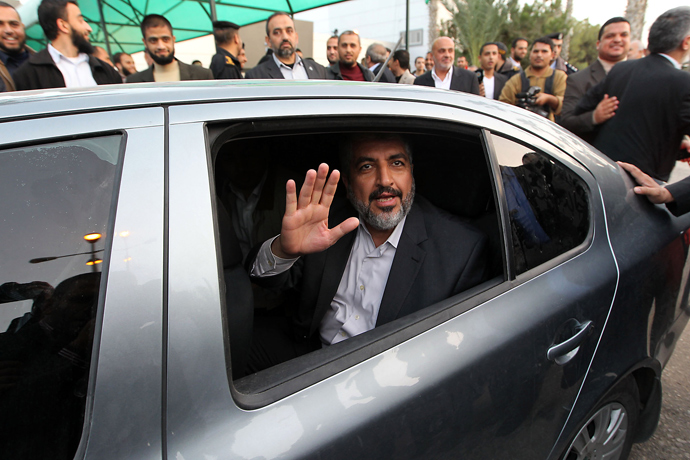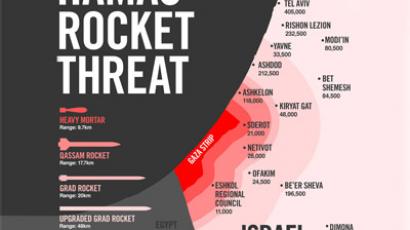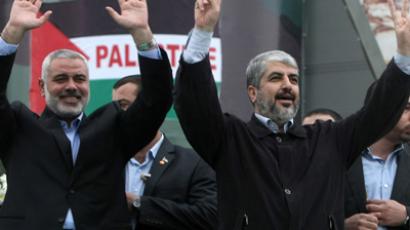Hamas grows stronger in West Bank with Israeli 'help'
Hamas is becoming more popular with Palestinians in the West Bank, which for years had been politically dominated by Mahmoud Abbas' Fatah party; Israel may passively contribute to this trend by failing to hold peace talks.
Hamas and Fatah have been at odds since 2006. Currently, they are running two rival governments operating out of Gaza and Ramallah respectively, each believing they represent the Palestinian people.
Hamas has been cornered in the West Bank since the rivalry
began, as its members are regularly arrested and jailed by
Palestinian Authority (PA) security forces. Only in December of
last year did Hamas supporters get a chance to openly walk the
streets for first time in five years, to celebratee the 25th
anniversary of the party.
But this power balance is changing: West Bank Palestinians say the Fatah government is too weak or inactive to bring peace with Israel.

"The Palestinian Authority is part of the problem, not a solution," Jamal Joumaa from the Separation Wall Committee told RT.
"President Abbas is a servant of the Israeli occupation.
Israel wants from the Palestinian Authority two things: A security
agent and a financial agent so it can control the Palestinian
people. The PA does this for them," he believes.
Joumaa organizes regular demonstrations against the PA. The only
thing that could change his opinion, he said, was if there was
demonstrable progress in Palestinian-Israeli dialogue. But the two
sides have not sat down together since September 2010. Many
moderate Palestinians are losing faith, and now look across their
border for inspiration.
Hamas’ growing popularity worrying to Israel
"The more the Palestinians despair of peace, the more Hamas will gain," Israeli journalist and peace activist Uri Avnery told RT. "If they don't believe in peace, they turn towards Hamas and say Hamas achieves with violence what Abu Mazen does not achieve with non-violence. As simple as that."
President Abbas refused to negotiate with Tel Aviv unless Israel freezes its settlement construction, something Prime Minister Benjamin Netanyahu will not do, despite US pressure. Israel's newly-formed right-wing coalition government is set to continue the settlement policy. However, by failing to talk to the PA, Netanyahu may be indirectly strengthening Israel’s archenemy, Hamas.

Sheikh Mahmoud Abu Tir once cut a lonely figure in Ramallah – he was among a minority of West Bank Palestinians who supported Hamas. He spent seven years in prison, he said, because he won a seat in the Palestinian government on a Hamas ticket. He has blamed the PA’s leaders as much as Israel.
"We, Hamas, have roots and historical depth. We are more strong in the West Bank than in Gaza since the elections in 2006, in spite of all the arrests and all the harm that our youth suffers in the Palestinian Authority prisons. People are convinced of our ways, our truth." Abu Tir told RT.
The next Palestinian elections are expected to take place in November this year. They have been postponed several times already due to Hamas-Fatah disagreements. Abbas' official term as president ended in 2009, but he continues to represent the PA since the two parties have failed to agree on the conditions and terms of the election.
Now, Fatah’s failed policies coupled with Israeli reluctance for
peace talks could make Hamas more attractive to Palestinians –
watch RT's Paula Slier reporting from Ramallah.















